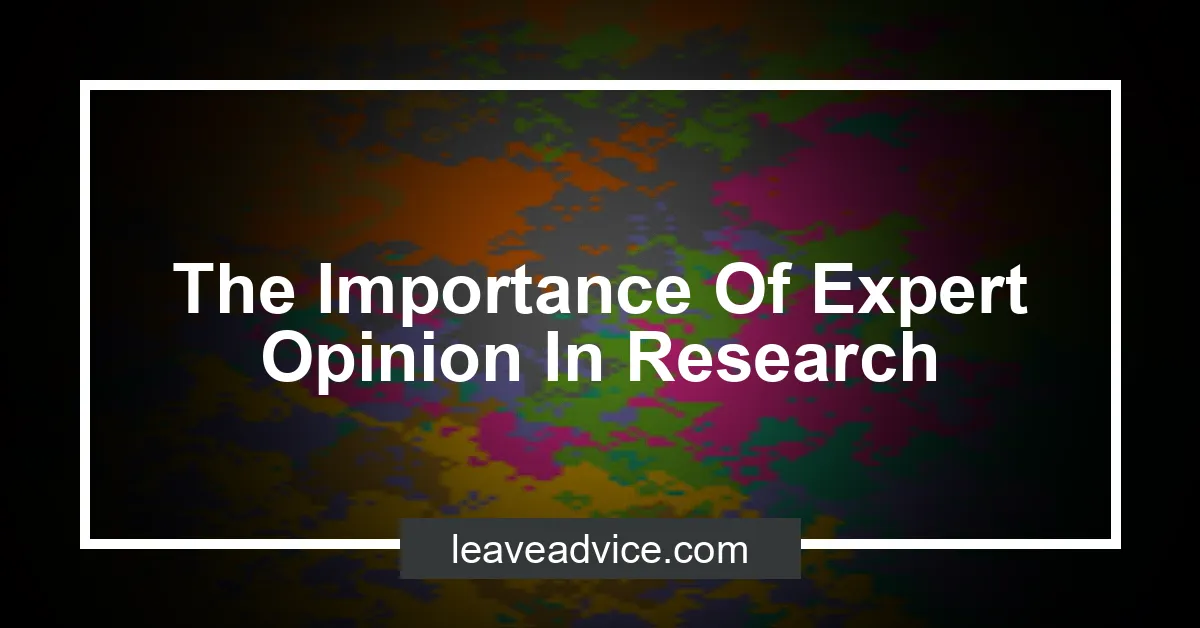The Importance Of Expert Opinion In Research


Expert opinion in research refers to the professional judgment of individuals with specialized knowledge and experience in a particular field. This expertise holds significant value in the scientific community, providing valuable insights and interpretations that contribute to the advancement of knowledge and understanding in various disciplines.
Expert opinions are often sought after to validate research findings, offer critical evaluations, and provide guidance for future studies.
Expert opinions play a crucial role in ensuring the credibility and reliability of research outcomes, as they are based on extensive knowledge, experience, and critical analysis within a specific field. In addition, the integration of expert opinions in research helps to bridge gaps in knowledge, address complex and challenging research questions, and offer diverse perspectives that enrich the scientific discourse.
This collaboration between experts and researchers ultimately leads to more robust and well-informed conclusions, benefiting the scientific community and society as a whole.
The importance of expert opinion in research extends beyond the validation and interpretation of findings. Experts also contribute to the development of evidence-based practices, guide policy-making decisions, and facilitate public understanding of complex scientific concepts.
Their input and insights are instrumental in shaping the direction of research, addressing societal challenges, and promoting the responsible and ethical conduct of scientific inquiry.
Check out this Youtube video: Discover the critical role of expert opinions in forensic science research and why they are essential in the investigation process!
The Role of Expert Opinion in Research
Providing expert insights and perspectives
Expert opinions play a crucial role in research by offering diverse perspectives and insights. These insights stem from years of experience and in-depth understanding of the subject matter, providing researchers with valuable alternative viewpoints to consider.
For example, in the field of healthcare research, experienced medical practitioners can contribute unique insights that stem from their practical experience, enriching the research with real-world relevance and practical applicability.
Ensuring validity and reliability of research findings
Expert opinions contribute to the validation and reliability of research findings by serving as a form of peer review. This involves subjecting research to scrutiny from professionals who possess extensive knowledge in the field.
For instance, in academic research, peer review from experts ensures that the findings are based on sound methodologies and credible evidence, strengthening the overall validity and reliability of the research.
Influencing research direction and focus
The role of expert opinion in research extends to shaping the direction and focus of studies. Experts, due to their profound understanding, can guide researchers towards the most relevant and impactful areas of study.
By providing focused advice, they help researchers navigate through the vast sea of possibilities and potential research paths, ensuring that the research aligns with the current needs and challenges of the respective field.
Benefits of Incorporating Expert Opinion in Research
Incorporating expert opinion in research yields multiple benefits, including improved quality, enriched analysis, and enhanced credibility of the research outcomes.
Expert Opinion vs. Layperson Opinion
Contrasting the significance of expert and lay opinions
Expert opinions are derived from years of specialized knowledge and experience in a specific field. They hold significant weight in research and decision-making processes, often providing invaluable insights and perspectives.
On the contrary, layperson opinions are generally based on personal beliefs or limited exposure to the subject matter, lacking the depth and breadth of expertise found in expert opinions. The contrasting significance lies in the credibility and reliability of the information conveyed.
Identifying the limitations of layperson input in research
The limitations of layperson input in research are evident in the lack of specialized knowledge and expertise, which can lead to biased or uninformed perspectives. Additionally, laypersons may not have access to the latest research developments or methodologies, impacting the accuracy and thoroughness of their input.
This can result in incomplete or misleading conclusions, underscoring the necessity of expert opinions to ensure the integrity and validity of the research findings.
| Contrasting Factor | Expert Opinion | Layperson Opinion |
|---|---|---|
| Knowledge & Expertise | Extensive, specialized knowledge | Limited, often anecdotal |
| Reliability & Credibility | High credibility and reliability | Variable, dependent on exposure |
| Research Impact | Formative influence | Limited impact |
While layperson views are valuable, they must be complemented and validated by expert opinions to ensure the highest standards of accuracy and reliability in research and decision-making processes.
The Impact of Expert Opinion on Research Outcomes
Empowering evidence-based decision making
Expert opinion plays a crucial role in empowering evidence-based decision making by providing valuable insights and perspectives based on years of experience and deep knowledge in specific fields. When researchers and decision-makers incorporate expert opinions into their analysis, they gain access to a wealth of practical knowledge that can significantly enhance the quality and validity of their decisions.
This empowerment leads to more informed and effective choices, ultimately driving better outcomes and developments.
Enhancing the practical applicability of research findings
The incorporation of expert opinions in research substantially enhances the practical applicability of findings. Experts bring real-world experience, nuanced understandings, and industry-specific expertise to the table, ensuring that research outcomes are relevant and applicable in practical scenarios.
By coupling academic research with expert insights, the outcomes become not only theoretically sound but also practically viable, bridging the gap between theoretical knowledge and real-world implementation.
Boosting the overall impact of research in various fields
By incorporating expert opinion, research gains credibility, relevance, and practicality, which collectively elevate its impact across various fields. Expert insights add an extra layer of validation and applicability to research outcomes, making them more influential and valuable to industries, organizations, and decision-makers.
This, in turn, paves the way for widespread adoption of research outcomes, fostering innovation, growth, and progress across diverse sectors.
| Expert Opinion Benefits |
|---|
| Empowering evidence-based decision making |
| Enhancing practical applicability of research findings |
| Boosting overall impact of research in various fields |
The inclusion of expert opinion in research outcomes is pivotal for empowering evidence-based decision making, enhancing the practical applicability of findings, and ultimately boosting the overall impact of research in various fields. Expert insights are invaluable in providing a holistic and application-oriented perspective, driving the significance and effectiveness of research in shaping real-world advancements.
Challenges and Controversies Surrounding Expert Opinion in Research
Addressing conflicts of interest and bias
Addressing conflicts of interest and bias in expert opinions is crucial for upholding the integrity of research outcomes. By transparently disclosing any potential conflicts and actively mitigating bias, the reliability and credibility of the research are enhanced, fostering trust among stakeholders.
Evaluating the objectivity and impartiality of expert opinions
Evaluating the objectivity and impartiality of expert opinions involves thorough scrutiny of the experts’ affiliations, funding sources, and past associations to ensure an unbiased perspective. This process ensures that the opinions presented are devoid of external influence, promoting the validity of the research findings.
Navigating conflicting viewpoints within the scientific community
Navigating conflicting viewpoints within the scientific community requires fostering open dialogue and robust debate while upholding mutual respect. This approach encourages the exploration of diverse perspectives, leading to comprehensive insights and innovative solutions in research domains.
| Conflict Resolution Strategies | Description |
|---|---|
| Assume Good Intentions | Encourages approaching conflicts with a positive mindset to facilitate productive discussions. |
| Listen Carefully | Emphasizes active listening to understand differing viewpoints and promote constructive engagement. |
| Assess Severity | Promotes assessing the magnitude of conflicts to implement proportionate resolutions effectively. |
These challenges and controversies underscore the need for meticulous handling of conflicts of interest, rigorous evaluation of objectivity, and constructive navigation of conflicting viewpoints to maintain the credibility and reliability of expert opinions in research.
The Ethical Considerations of Expert Opinion in Research
Ensuring transparency and integrity in the research process
Research transparency and integrity are crucial for maintaining public trust and avoiding duplication of effort. Making research findings publicly accessible, declaring conflicts of interest, and ensuring the availability of data and analysis methods enable reproducibility and uphold ethical standards in the research process.
Upholding ethical standards in utilizing expert opinions
Utilizing expert opinions ethically involves advocating for research conclusions with clear and accurate records. Researchers must adhere to core values of objectivity, honesty, openness, fairness, accountability, and stewardship to ensure the integrity of the research process.
Navigating ethical dilemmas in research decision-making
Navigating ethical dilemmas in research decision-making involves recognizing conflicting values, identifying viewpoints, gathering resources, and formulating action plans based on ethical standards. It requires aligning research practices with the principles of beneficence, nonmaleficence, autonomy, and justice and applying classic ethical decision-making frameworks.
| Ethical Considerations | Examples |
|---|---|
| Transparency and Integrity | Making research findings publicly accessible |
| Ethical Standards | Adhering to core values of objectivity and accountability |
| Navigating Dilemmas | Recognizing conflicting values and formulating action plans |
In research, upholding transparency and integrity, adhering to ethical standards, and navigating ethical dilemmas are essential for maintaining public trust and advancing knowledge.
Historical Perspectives on the Role of Expert Opinion in Research
Tracing the evolution of expert opinion in research
Expert opinion in research has evolved significantly throughout history, from the early days of anecdotal evidence to the present-day emphasis on evidence-based practice. In ancient times, expert opinion primarily relied on individual experiences and observations, often lacking systematic methods.
As research methodologies advanced, the integration of expert input expanded to encompass empirical evidence, rigorous clinical trials, and data-driven analyses. This evolution marked a pivotal shift towards a more comprehensive and scientific approach to expert opinion in research.
Highlighting key milestones and paradigm shifts in the integration of expert input
Key milestones in the integration of expert input include the transition from anecdotal evidence to evidence-based practice, the establishment of clinical expertise in conjunction with current best evidence, and the recognition of the crucial role of expert opinion in guiding patient care. Paradigm shifts have been evident in the increasing reliance on systematic reviews, meta-analyses, and the synthesis of diverse expert viewpoints, shaping a more holistic and inclusive approach to incorporating expert opinion in research.
The fusion of clinical expertise, evidence-based strategies, and patient values has redefined the landscape of expert input, emphasizing the importance of multidisciplinary collaborations and comprehensive data analysis.
| Evolutionary Stage | Key Milestones/Paradigm Shifts |
|---|---|
| Early Anecdotal Evidence | Transition to Evidence-Based Practice |
| Integration of Empirical Evidence | Emphasis on Clinical Expertise |
| Expansion to Systematic Data Analysis | Recognition of Multidisciplinary Collaborations |
This progression underscores the seismic shifts and pivotal milestones that have shaped the role of expert opinion in research, underpinning its significance in driving advancements and enriching the scientific community’s understanding.
The Intersection of Expert Opinion and Research Methodologies
Integrating expert opinions within qualitative and quantitative research frameworks
Expert opinions play a critical role in both qualitative and quantitative research frameworks. In qualitative research, expert opinions provide invaluable insights into human behavior, emotions, and experiences, enriching the depth and context of the findings.
On the other hand, in quantitative research, expert opinions help validate hypotheses, refine research designs, and provide nuanced interpretations of statistical data, enhancing the overall credibility and rigor of the study.
In both qualitative and quantitative research, the integration of expert opinions allows for a more comprehensive understanding of the research topic, fostering a holistic approach that considers not only the data but also the nuanced perspectives and insights from individuals with specialized knowledge.
The Influence of Expert Opinion on Policy Making and Governance
Examining the impact of expert input on public policy and governance
Expert input plays a crucial role in shaping public policy and governance by providing valuable insights and recommendations derived from extensive knowledge and experience. The influence of experts on policy-making processes is undeniable, as their expertise contributes to the development of well-informed decisions aimed at addressing complex societal and global challenges.
Illustrating examples of how expert opinions have shaped global initiatives and regulations
One notable example of expert opinion shaping global initiatives is the implementation of inclusive policies across global organizations to support diversity and inclusion in the workplace, emphasizing the significance of expert input in fostering positive change at an organizational level. Another impactful instance is the role of experts in global public policy, from agenda-setting to monitoring and implementation efforts, highlighting their growing influence amidst increasingly complex global problems.
The Collaborative Nature of Expert Opinion in Multidisciplinary Research
Emphasizing the value of diverse expert perspectives in interdisciplinary research
Experts from various fields bring unique perspectives and knowledge, enriching the research with comprehensive insights. For instance, in a study on environmental sustainability, involving experts in ecology, economics, and social sciences can lead to a holistic understanding of the topic, ensuring well-rounded solutions.
Showcasing successful collaborations between experts from different fields
A prime example of successful collaboration is the field of medical technology, where engineers, physicians, and biologists work together to create innovative medical devices. This collaboration ensures that not only the technical aspects are met, but also the practical and clinical requirements, leading to groundbreaking advancements in healthcare technology.
Harnessing Expert Opinion as a Tool for Innovation and Progress
Showcasing examples of groundbreaking discoveries and innovations rooted in expert opinions
Groundbreaking discoveries and innovations have often been intertwined with expert opinions, leading to significant advancements in various fields. For instance, the discovery of antibiotics, attributed to the expert opinion of Alexander Fleming, revolutionized medical treatment and saved countless lives.
Similarly, the role of expert astronomers such as Nicolaus Copernicus and Galileo Galilei led to paradigm-shifting discoveries about the solar system, challenging existing beliefs and paving the way for modern astronomy. These examples underscore the profound impact of expert opinion on groundbreaking innovations.
Highlighting the role of expert opinions in driving technological advancements and scientific breakthroughs
Expert opinions play a pivotal role in propelling technological advancements and scientific breakthroughs. Take, for instance, the role of experts in the development of Artificial Intelligence (AI), which has transformed various industries.
Additionally, experts in the field of medical imaging have significantly enhanced diagnostic capabilities, leading to improved healthcare outcomes. Furthermore, expert contributions in the creation of the internet have revolutionized global connectivity and information dissemination.
These examples highlight the indispensable role of expert opinions in driving innovation and progress across different domains, ultimately shaping the trajectory of human advancement.
The Evolution of Peer Review and Expert Evaluation in Research
Tracing the evolution of peer review processes in the validation of expert opinions
Peer review processes have undergone significant evolution, transitioning from traditionally localized evaluations to globalized and multidisciplinary assessments. In the past, peer review was often conducted within small academic circles, while today, it encompasses a much broader spectrum of expertise and viewpoints.
As research methodologies advance, peer review processes have adapted to include a more diverse range of expert opinions from various fields, enabling a more comprehensive validation of research findings.
Examining the critical role of expert evaluation in the advancement of research methodologies
Expert evaluation plays a pivotal role in driving forward the advancement of research methodologies. It provides a mechanism for ensuring the integrity and accuracy of research findings, thereby enhancing the credibility and reliability of academic work.
By scrutinizing the methodologies and findings from a diverse range of perspectives, expert evaluation contributes to the robustness and validity of research, fostering the evolution of innovative and impactful methodologies. The critical role of expert evaluation also lies in instilling confidence in the research community and the broader public, reinforcing the foundation of knowledge and progress.
| Evolution of Peer Review | The Role of Expert Evaluation |
|---|---|
| Transition to globalization | Driving validity and credibility |
| Inclusion of diverse expertise | Advancing research methodologies |
| Broader validation scope | Instilling confidence and progress |
The Future of Expert Opinion in Research
Since the dawn of human inquiry, the role of expert opinion in research has been vital. However, with the ongoing technological advancements, the landscape is shifting towards a greater reliance on data-driven insights.
Predicting trends and shifts in the utilization of expert opinions has become increasingly challenging as technology continues to evolve at a rapid pace. As AI becomes more sophisticated, it has the potential to provide immense volumes of data and perform complex analyses, leading to a higher emphasis on empirical evidence over individual expert opinions.
Furthermore, the potential impact of advancing technology on expert input in research is monumental. With the integration of AI and machine learning algorithms, the scope for unbiased data processing and pattern recognition is expanding exponentially.
This transformation has the potential to revolutionize the way research is conducted, reducing the reliance on individual experts in favor of data-driven insights and predictive analytics. The collaborative role of experts and technology in research will likely evolve to a state wherein human expertise will be complemented and enriched by the insights generated through advanced technological tools.
| Advancing Technology | Expert Opinion |
|---|---|
| Data-Driven Insights | Traditional Approach |
| AI and Machine Learning | Human Expertise |
| Unbiased Data Processing | Individual Opinions |
| Predictive Analytics | Collaborative Role of Experts |
The future of expert opinion in research is poised to undergo a significant transformation, with technological advancements influencing the utilization of expert insights and shifting the paradigm towards data-driven analyses. As we navigate this evolution, it is essential to recognize the complementary roles of expert opinions and advancing technology in shaping the research landscape.
Recommended Amazon Products for Incorporating Expert Opinion in Research
Here’s a curated list of products that can help you incorporate expert opinion into your research with ease. These recommendations are based on the importance of expert opinion in research.
Tableau Desktop Professional Edition


Tableau Desktop Professional Edition is ideal for visualizing and analyzing data, allowing researchers to present expert opinions in a clear and compelling manner. With its user-friendly interface and robust features, it enables seamless integration of expert insights into research presentations.
| Pros | Cons |
|---|---|
| 1. Intuitive data visualization tools | 1. Relatively high price |
| 2. Versatile compatibility with various data sources | 2. Steeper learning curve for advanced features |
| 3. Strong support for real-time data analysis | 3. Requires adequate hardware resources |
Scientific Writing and Communication: Papers, Proposals, and Presentations


This comprehensive resource by Angelika H. Hofmann provides valuable guidance for incorporating expert opinions in research writing and presentations. It offers practical insights on effectively communicating expert viewpoints and enhancing the credibility of research outcomes.
| Pros | Cons |
|---|---|
| 1. In-depth coverage of scientific communication | 1. May be more suitable for advanced researchers |
| 2. Practical tips for engaging expert audiences | 2. Limited focus on quantitative data representation |
| 3. Emphasizes ethical considerations in research | 3. Not specifically geared towards data analysis |
Qualitative Inquiry and Research Design: Choosing Among Five Approaches


This book by John W. Creswell offers valuable insights into incorporating expert perspectives within qualitative research methodologies. It provides a comprehensive framework for leveraging expert opinion in multidisciplinary research endeavors.
| Pros | Cons |
|---|---|
| 1. Detailed guidance on qualitative research methods | 1. Predominantly qualitative research focus |
| 2. Emphasis on collaborative expert input | 2. Less emphasis on quantitative analysis |
| 3. Practical application of expert opinions | 3. May not fully address quantitative data integration |
Livescribe Aegir Smartpen


The Livescribe Aegir Smartpen enables researchers to capture and digitize expert discussions and insights in real time, enhancing the depth and accuracy of research data collection.
| Pros | Cons |
|---|---|
| 1. Seamless integration with note-taking applications | 1. Requires specialized paper for handwriting capture |
| 2. Real-time transcription of expert discussions | 2. Relies on Bluetooth connection for data transfer |
| 3. Cloud storage for easy access to recorded insights | 3. Learning curve for accessing advanced features |
CRC Handbook of Chemistry and Physics


As a reliable reference for scientific data and expert opinions in various fields, this handbook is a valuable resource for researchers seeking authoritative information to support their work.
| Pros | Cons |
|---|---|
| 1. Wide-ranging expert insights across scientific disciplines | 1. Bulky physical format may be less portable |
| 2. Access to critical scientific data and formulae | 2. Limited to specific fields of study |
| 3. Trusted source for expert-reviewed information | 3. Higher cost compared to digital resources |
Top Recommended Product for Incorporating Expert Opinion in Research
If you’re looking for the best solution for incorporating expert opinion in your research, we highly recommend the Tableau Desktop Professional Edition (https://www.amazon.com/s?k=Tableau+Desktop+Professional+Edition). With its advanced data visualization tools and seamless integration capabilities, it offers a robust platform for presenting and analyzing expert insights in research endeavors. Ready to elevate the impact and credibility of your research? Check out the Tableau Desktop Professional Edition today!


Conclusion
Expert opinion plays a pivotal role in driving research progress by providing valuable insights, perspectives, and guidance based on extensive knowledge and experience. Experts are able to offer unique and specialized viewpoints that can lead to innovative approaches and solutions to complex research challenges, ultimately advancing the field and contributing to new discoveries.
Additionally, the continued importance of soliciting and integrating expert perspectives in research endeavors cannot be overstated. By actively seeking out and considering the opinions of experts, researchers can ensure the thoroughness and credibility of their work, as well as gain access to valuable mentorship and collaboration opportunities.
This integration of expert opinions fosters a more comprehensive and well-rounded approach to research, leading to more impactful and meaningful outcomes.
Expert opinion in research is vital for driving progress and advancing the field. By recognizing and integrating the expertise of professionals, researchers can benefit from a wealth of knowledge and guidance, ultimately leading to more thorough, credible, and impactful research outcomes.
The continued emphasis on soliciting and integrating expert perspectives is essential for the continued advancement of research endeavors.




